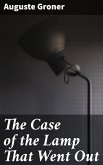In "The Case of the Golden Bullet," Auguste Groner delivers a captivating detective narrative that immerses readers in the intricate world of crime and mystery. The novella follows the astute Inspector Paul Lessing as he navigates an enigmatic murder case entwined with themes of justice and morality. Groner employs a meticulous style, characterized by suspenseful pacing and sharp dialogue, which evokes the turbulent socio-cultural landscape of early 20th-century Austria. His intricate plotting and psychological insights elevate the work beyond mere genre fiction, inviting readers to reflect on the nature of truth and deception. Auguste Groner, an influential figure in the crime fiction genre, was deeply inspired by the literary movements of his time, particularly those exploring psychological depth and moral ambiguity. Born in 1850 in the Austrian Empire, Groner's diverse experiences, from his education in law to his travels across Europe, imbued him with a nuanced understanding of human behavior. This background naturally influenced his creation of Inspector Lessing, a character who embodies both intellect and emotional complexity, revealing the darker facets of human nature. Readers of detective fiction and historical mysteries will find "The Case of the Golden Bullet" an essential addition to their libraries. Groner'Äôs skillful narrative weaves a complex tapestry of intrigue that not only entertains but also prompts profound questions about the nature of justice. This novella is sure to leave a lasting impression on those who venture into its pages, making it a compelling read for anyone interested in the evolution of the genre.
Dieser Download kann aus rechtlichen Gründen nur mit Rechnungsadresse in A, B, BG, CY, CZ, D, DK, EW, FIN, F, GR, H, IRL, I, LT, L, LR, M, NL, PL, P, R, S, SLO, SK ausgeliefert werden.









